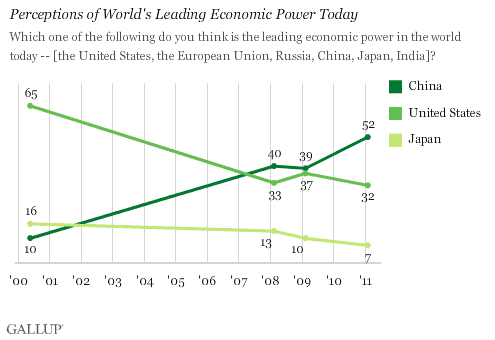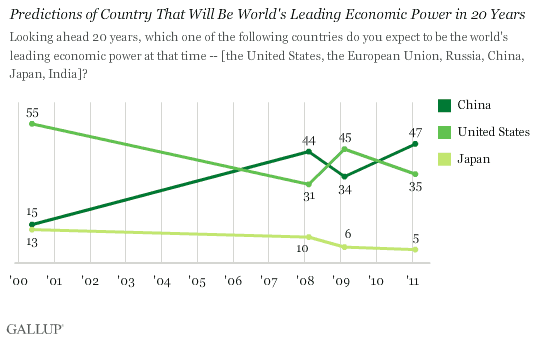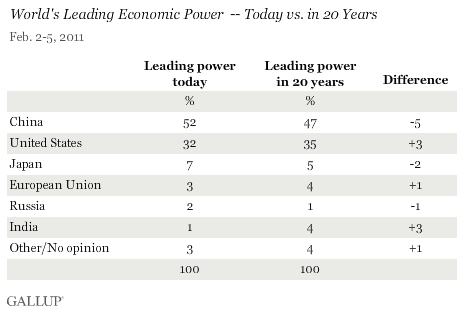PRINCETON, NJ - By 52% to 32%, Americans are more likely to name China than the United States as the leading economic power in the world today, with Japan a distant third at 7%. This is China's strongest lead on this Gallup measure, first asked in 2000, and is a major change from 2009, when China and the U.S. were nearly tied in Americans' perceptions about the leading power.

The latest update is part of Gallup's annual World Affairs survey, conducted Feb. 2-5.
The poll also finds a 13-point surge since 2009 in the percentage of Americans who believe China will be the world economic leader in 20 years. The 47% now saying this eclipses the 35% choosing the U.S. as the leader; however, China's lead over the U.S. on this measure is smaller than it is for perceptions about who leads today, and is not appreciably different from what it was in 2008.

No other country figures very largely in Americans' perceptions of the world's top economic powerhouse, with respect to either the present or the future. Fewer than 5% of Americans cite the European Union, Russia, or India as the leading power in either context.

Consumer Attitudes About U.S. Economy Do Not Align With Rate of China's Surge
China is enjoying explosive economic growth and, as a result, has made impressive gains in the rank-order of national economies in the past decade. However, the Gallup data suggest Americans may not be aware that, on the basis of GDP, China's economy still trails the United States'. Alternatively, Americans' conception of the "leading economic power" may take into account more than nations' relative economic output, and could reflect awareness that China enjoys economic momentum at the same time that U.S. jobs are being outsourced to China, and that China is a substantial holder of U.S. debt.
Consumer attitudes about the U.S. economy, by themselves, fail to explain Americans' outsized views of China's economic position. Americans were mostly positive about U.S. economic conditions a decade ago -- in May 2000, the Gallup Economic Confidence Index registered a fairly robust +36 -- and at that time, Americans believed the U.S. was dominant economically. While Americans have been more negative about the economy in recent years, they are far less negative in 2011 than they were in 2008 and 2009. Nevertheless, perceptions that China is the dominant economic power have continued to rise, suggesting that declining consumer attitudes about the U.S. economy are not the sole cause.
Bottom Line
Few would argue that China's rocketing economic growth looms as a formidable challenge to the United States' global economic leadership. However, the majority of Americans believe the U.S. has already lost the challenge, and relatively few are confident that the situation will be reversed in 20 years. A strong economic recovery in the U.S. may improve how Americans feel about the United States' economic competitiveness, but whether it would wholly alter their perceptions that the U.S. now trails China in global economic power is unclear.
Survey Methods
Results for this Gallup poll are based on telephone interviews conducted Feb. 2-5, 2011, with a random sample of 1,015 adults, aged 18 and older, living in the continental U.S., selected using random-digit-dial sampling.
For results based on the total sample of national adults, one can say with 95% confidence that the maximum margin of sampling error is ±4 percentage points.
Interviews are conducted with respondents on landline telephones (for respondents with a landline telephone) and cellular phones (for respondents who are cell phone-only). Each sample includes a minimum quota of 150 cell phone-only respondents and 850 landline respondents, with additional minimum quotas among landline respondents for gender within region. Landline respondents are chosen at random within each household on the basis of which member had the most recent birthday.
Samples are weighted by gender, age, race, education, region, and phone lines. Demographic weighting targets are based on the March 2010 Current Population Survey figures for the aged 18 and older non-institutionalized population living in continental U.S. telephone households. All reported margins of sampling error include the computed design effects for weighting and sample design.
In addition to sampling error, question wording and practical difficulties in conducting surveys can introduce error or bias into the findings of public opinion polls.
View methodology, full question results, and trend data.
For more details on Gallup's polling methodology, visit www.gallup.com.
